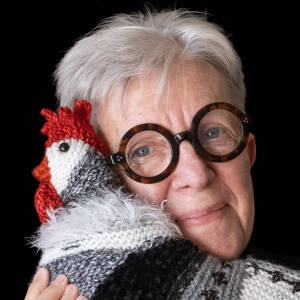Clean and sober, reassembling their lives
Left to right, that's Sheri's friend Jacque, who just got a job today; then Sheri holding her baby, and seated to the right is another Sherry, pregnant and due last week--expecting any moment now. Sheri began living in the streets when she was twelve. Like most kids who choose the streets, she was running away from an unsafe home where addiction led to abuse. The streets were a safer place to be. In the streets she was taken in by other houseless people who made a home for her and protected her.
"My street family believed in me. They saw strength in me and goodness. I never got abused in the streets. It was street elders who taught me values: you never take from people who have less than you, make sure nobody in the group goes hungry. You check on each other morning and night. That first year I met my boyfriend, and I stayed with him till I was nineteen. I still love him. He's my childhood sweetheart, my first child's father. He has seven more years to serve in jail. I'm married to someone else now, a good man, this baby's father. My husband lives in California, and I hope one day I can get my kids back and go live with him, but my first love will always be my first love."
Sheri became a meth addict in the streets and was ridden by that addiction for some years. She used dirty needles, she was careless, she spent six years in jail, and she says with some wonder, "It's only thanks to the grace of the Creator that I don't have AIDS or Hepatitis C."
She's thirty-four now and has four children, but only the baby, born while she was in a treatment center, lives with her. The other three are in foster care. Sheri and the baby live in housing for women who have been through drug treatment and are clean and sober. She works at Cityteam Ministries in Women's Services. "I work there several days a week if I can get child care. At the Cityteam center women can get showers, a sandwich, some clothes, and a little kindness. I like to be there for them."
"What I want for the future is to continue working with my people. I'd like to get a paid job in a non-profit. I don't ever want to forget where I came from. I've been clean for two years. My street family is still my main support. If I go without, they get on me, they're like, 'Why? why? Just tell us if you need something, we'll get it for you!' They keep people who are on drugs away from me because sometimes I'm tempted to take care of people, but that's when I have to back off. We have to decide to take care of ourselves first, and then if we're working on that, we can accept support, but not care-taking.
"What would I like to change? I'd like to see more compassion. I'd like people not to judge us. I'd like them to know that every one of us has a story, and it's probably not the story they think it is. If people have compassion, maybe they can volunteer in programs for houseless people, or maybe they can give money, if they have it, to organizations that help us. They can donate to Outside In, or Sisters of the Road. Without these organizations we'd have no health care and we'd be hungry, and when we're sick and hungry, we can't make good decisions. These non-profits are doing so much good. There's a church called Street Church that does wonderful work with young people. If somebody's a Christian, they might give to them. But money is not the main thing. The main thing is not to judge us, and to have compassion."

Comments
Sign in or get an account to comment.


